What is Sustainability?
What do you think sustainability is?
The word sustainability is derived from the Latin sustinere (to hold). Sustain can mean maintain, support or endure.
There is no universal definition on what sustainability is. There are many different views on what it means and how it can be achieved. The idea of sustainability stems from the concept of sustainable development which became common language at the World's first Earth Summit in Rio in 1992.
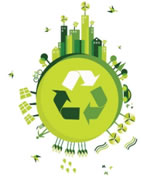
See more on:
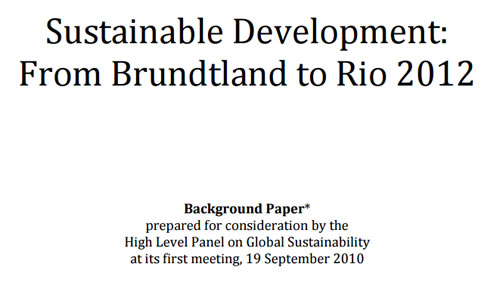
Def. 1:
It is to meet the needs of the present without compromising the ability of future generations to meet their own needs. (Bruntland Report for the World Commission on Environment and Development)
Def. 2:
It is improving the quality of human life while living within the carrying capacity of the Earth’s supporting eco-systems.
Def. 3:
A process of change in which the exploitation of resources, the direction of investments, the orientation of technological development and institutional change are all in harmony and enhance both current and future potential to meet human needs and aspirations.
Sustainability: one word, many meanings
Sustainability: one word, many meanings
Social Sustainability: is the ability of a social system, such as a country, family, or organization, to function at a defined level of social well-being and harmony indefinitely. Problems like war, endemic poverty, widespread injustice, and low education rates are symptoms a system is socially unsustainable.Environmental Sustainability: is the ability of the environment to support a defined level of environmental quality and natural resource extraction rates indefinitely. This is the world's biggest actual problem, though since the consequences of not solving the problem now are delayed, the problem receives too low a priority to solve.
Economic Sustainability: is the ability of an economy to support a defined level of economic production indefinitely. Since the Great Recession of 2008 this is the world's biggest apparent problem, which endangers progress on the environmental sustainability problem.
As you probably have noticed watching TV, reading a magazine or a newspaper, talking with Institutions, in recent years the use of the word sustainability has considerably increased. New concepts concerning lifestyles, decision-making, actions and future perspective on a global level have been developed and also new words were created around the concept of sustainability.
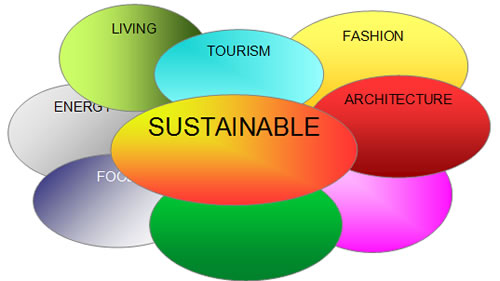
Ask yourself
What is Sustainability for a Farming System?
What is Biodiversity for a Farming System?
Keep in mind
It is generally accepted that sustainable development calls for convergence amongst the three pillars of economic development, social equity and environmental protection.If any pillar is weak then the system as a whole is unsustainable.
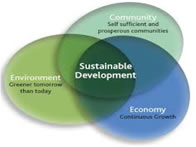
What is Sustainability for a Farming System?
There are different ways to improve sustainability in Agriculture. These can vary from country to country, region to region. As a farmer you can also try to take a more sustainable approach sharing some common practices you surely already know. All these practices contribute to long-term farm profitability, environmental stewardship and rural quality of life. Here you can find a list of the most implemented:
Integrated Pest Management (IPM)
IPM manages pests by combining biological, cultural, physical and chemical tools in a way that minimises economic, health and environmental risks.Rotational Grazing
Management grazing systems take animals out of barns to pastures providing high-quality forage and reducing feed and management costs, avoiding fertilization and manure buildup.Soil Conservation
Many soil conservation methods, including strip cropping, reduce tillage and “no-till,” help prevent loss of soil due to wind and water erosion.Water Quality
Water conservation and protection are fundamental for sustainable agriculture. Many practices improve quality of drinking and surface water, as well as to protect wetlands. Wetlands play a key role in filtering nutrients and pesticides, in addition to providing wildlife habitat.Cover Crops
Growing plants such as rye or clover in the off season after harvesting provides many benefits, including weed and erosion control, and improved soil nutrients and soil quality.Crop/Landscape Diversity
Growing a greater variety of crops on a farm reduces risks from extremes in weather, market conditions or crop pests. It also contributes to soil conservation, wildlife habitat and increased populations of beneficial insects.Nutrient Management
Central management of nitrogen and other plant nutrients improves the soil and protects the environment. Increased use of on-farm nutrient sources, such as manure and leguminous cover crops, reduces the need to buy fertilizer.Marketing
Provides a key way to enhance profitability and contributes to sustainability especially thanks to direct selling (SEE module 3)Look at this video:

Biological Diversity
Biodiversity represents the variability among living organisms from all sources including terrestrial, marine and other aquatic ecosystems and the ecological complexes of which they are a part; this includes diversity within species, between species, and of ecosystems.
What is Biodiversity for a Farming System?
Biodiversity and agriculture are strongly interrelated because good practices in agriculture contribute to conservation and sustainable use of land, water, animals, energy, etc. Indeed, sustainable agriculture both promotes and is enhanced by biodiversity. Maintenance of this biodiversity is essential for the sustainable production of food and other agricultural products and the benefits these provide to humanity, including food security, nutrition and livelihoods.
Remember that your activity can make an important contribution to the conservation of biodiversity, especially in terms of:
TRADITIONAL PROCESSING
ORGANIC AGRICULTURE
SPECIES CONSERVATION
LOCAL BREEDS
BIODYNAMIC AGRICULTURE
AGROFORESTRY
NO GMO
OLD RECIPES
Ask yourself
Quality Certification
Certification is the formal procedure by which an accredited or authorized person or agency assesses and verifies (and attests in writing by issuing a certificate) the attributes, characteristics, quality, qualification, or status of individuals or organizations, goods or services, procedures or processes, or events or situations, in accordance with established requirements or standards.Quality Certification
As a farmer the needs that you have to satisfy in terms of quality can be:
Primary Needs: connected with the protection of fundamental rights such as health, security, dignity and life in general.Secondary Needs: related to the development of the economy or to the growth of the welfare of society
As a consequence they are characterized by different degrees of priority and levels of protection:
- The primary needs are protected by the law of the State through Technical Rules (mandatory) prescribing the essential requirements for the protection of general public interest, such as safety and health.
- The secondary needs are covered by the Technical Standards or normative documents equivalents (volunteers) that are produced by the standardization bodies and other subjects entitled by the consent of all the parties.
The mismatch with Technical Standards (voluntary certification) does not constitute a breach of the law, but the absence of voluntary certification may foreclose or otherwise can be a disadvantage for you against the market itself, even if it does not mean payment sanctions.
Voluntary Certification may concern:
- Personnel
- Products
- Systems
The certification is voluntary, but the compliance is mandatory, because rules are established by law.
Accreditation is a service undertaken in the public interest so that business users, final consumers, government departments and local authorities can have trust, right through to the final link in the production and distribution chain, in the quality and safety of the goods and services available in an increasingly globalised market.Roles:
Standard writers (subjects which decide the rules to be observed)
- At International level: IEC (electric sector) or ISO (any other)
- At European level: CENELEC (electric sector) or CEN (any other)
- At National level: in Italy CEI (electric sector) or UNI (any other)
Accreditation Authority: each European Country has an accreditation body.
The national body is responsible for accreditation in compliance with the International Standards of the series ISO 17000 and of the guides and the harmonised series of European norms EN 45000. All bodies are non-profit-distributing organisations.
In Italy: ACCREDIA
In Greece: Hellenic Accreditation System E.SY.D.
In Brussels: AJOUTEZ
Other Certifications
Quality can be certified. This means that an authorised organisation (“third party”) writes, under its responsibility, having done all required controls that a product, a process, a service or a professional figure are in accordance with a law or a set of requirements.
Certification schemes can be mandatory, or voluntary, and can be, for example, necessary to be allowed to export products to a certain country, or even to a certain kind of clients, who require certifications as a base B2B guarantee.
Main certification typologies
Regulated certifications:- POD-PGI and TSG
- Biologico (Reg CE 834/07),
- Organic, integrated farming
- Traceability -“from farm to fork” (ISO 22005:2007)
- Product disciplinary: BRC (British Retailer Consortium) and IFS (International Food Standard) for processing firms
- GLOBALGAP (ex EUREPGAP) for fruits and vegetables;
- “No GMO”, etc.
- quality management (ISO 9001)
- environment (ISO 14001)
- food safety (ISO 22000:2005)
- workers’ health and safety (OHSAS 18001), etc.
1. Regulations:
- PDO,
- PGI,
- TSG,
- Organic,
- etc.
- Integrated agriculture,
- “from farm to fork”,
- no GMO,
- BRC (British Retailer Consortium) and IFS (International Food Standard),
- GLOBALGAP,
- etc.
- Environmental management ISO 14001
- Quality management ISO 9001
- Food safety management ISO 22000:2005
- Occupational health and safety management OHSAS 18001
- HACCP

Religious certifications
Religious certifications are granted by private organizations and there is no EU regulation, but only religious law to be complied with.

In order to obtain the Halal certification, all the value chain involved in the production process needs to be recognized as Halal. The Halal certification encompasses the quality control in every step of the production process and of the supply chain, the manufacturing process, the warehousing and logistics, in incoming and outgoing transport. Last but not least, the Halal certification also affects the provision of financial means and of corporate social responsibility. The Halal certification may be issued in favour of trade sales, including large-scale retail and outlets too.
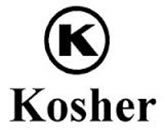
Another example is the Kosher Certification. Kosher refers to a set of intricate biblical laws that detail the types of food that a Jewish person may eat and the ways in which it may be prepared.
To be certified Kosher, all ingredients in every product and the process of preparing the product must be certified for kosher-compliance too.
Why acquire a product certification?
| Product Certification | Certification Management System | |
| Object | Product Quality(based on a specific characteristic) | Quality systemm |
| Applied to | Product | Company |
| Destined for | Consumer | Client |
| Goal | Satisfaction | Reliability |
| Reference | Disciplinary and Regulation | Standard ISO 9000 |
| Standard | DEN 45011 | EN 45012 |
| Control body | Recognized/Notified/Accredited | Accredited |
| Effects | Conformity of the product | Conformity of the Company or its Department |
| Valorization | Label on product and possibility of promotion | Promotion of the company, no product label admitted |
Product Certification is an element of clarity for the consumer and an opportunity for your farm to enhance the efforts you made in the direction of the Quality.
Certification in the agri-food sector brings significant benefits both for consumers and farmers as well. Especially in the case of food crises, communication about quality becomes a fundamental aspect, assuring consumers of a good number of quality characteristics and continuity.
That is why certification may represent not only a way of enhancing a products value, but also an important lever for organizational and professional growth of your enterprise.



